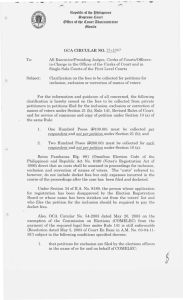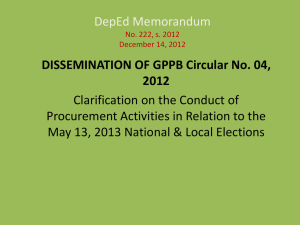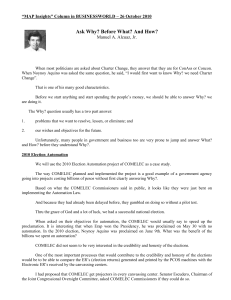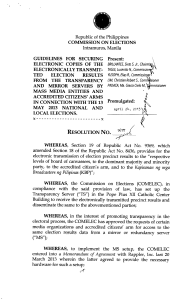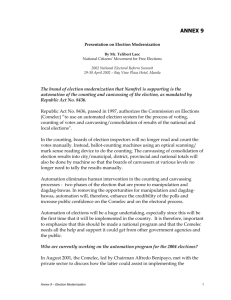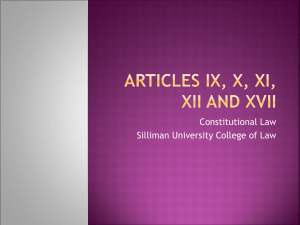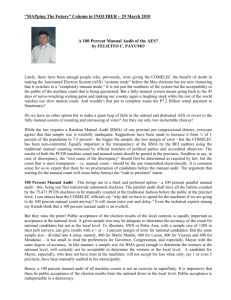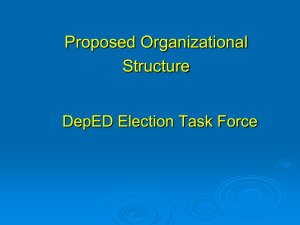TAULE vs. SANTOS
advertisement
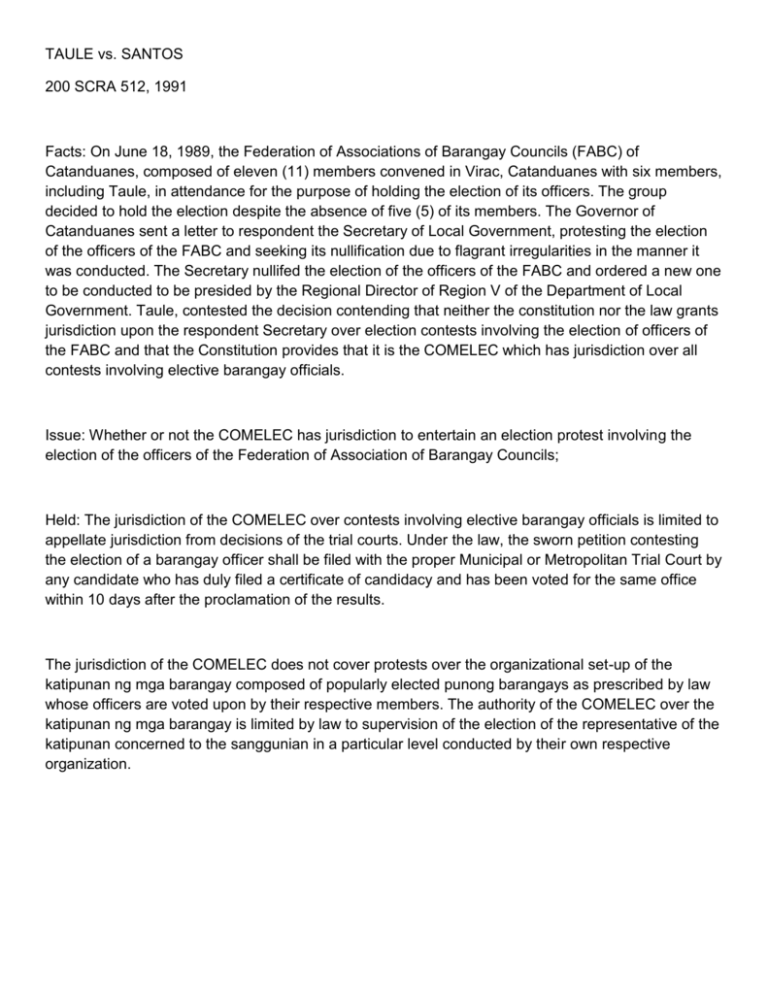
TAULE vs. SANTOS 200 SCRA 512, 1991 Facts: On June 18, 1989, the Federation of Associations of Barangay Councils (FABC) of Catanduanes, composed of eleven (11) members convened in Virac, Catanduanes with six members, including Taule, in attendance for the purpose of holding the election of its officers. The group decided to hold the election despite the absence of five (5) of its members. The Governor of Catanduanes sent a letter to respondent the Secretary of Local Government, protesting the election of the officers of the FABC and seeking its nullification due to flagrant irregularities in the manner it was conducted. The Secretary nullifed the election of the officers of the FABC and ordered a new one to be conducted to be presided by the Regional Director of Region V of the Department of Local Government. Taule, contested the decision contending that neither the constitution nor the law grants jurisdiction upon the respondent Secretary over election contests involving the election of officers of the FABC and that the Constitution provides that it is the COMELEC which has jurisdiction over all contests involving elective barangay officials. Issue: Whether or not the COMELEC has jurisdiction to entertain an election protest involving the election of the officers of the Federation of Association of Barangay Councils; Held: The jurisdiction of the COMELEC over contests involving elective barangay officials is limited to appellate jurisdiction from decisions of the trial courts. Under the law, the sworn petition contesting the election of a barangay officer shall be filed with the proper Municipal or Metropolitan Trial Court by any candidate who has duly filed a certificate of candidacy and has been voted for the same office within 10 days after the proclamation of the results. The jurisdiction of the COMELEC does not cover protests over the organizational set-up of the katipunan ng mga barangay composed of popularly elected punong barangays as prescribed by law whose officers are voted upon by their respective members. The authority of the COMELEC over the katipunan ng mga barangay is limited by law to supervision of the election of the representative of the katipunan concerned to the sanggunian in a particular level conducted by their own respective organization. Rulloda vs Comelec Facts: Comelec denied petitioner’s request to substitute her deceased husband in the Barangay Chairman Candidacy despite the fact that petitioner apparently garnered the highest votes when constituents wrote her name in the ballots. Respondents cited resolution 4801 and Section 7 of the Omnibus Election Code which prohibits substitution of candidates. Private respondent Placido contended that it was only right that he be proclaimed winner since he was the only one who filed a certificate of candidacy and, hence, the only candidate running. Issue: Whether or not there was grave abuse of discretion when Comelec denied petitioner’s request that she be allowed to run for elections. Ruling: There being no specific provision governing substitution of candidates in barangay elections, a prohibition against said substitution cannot be said to exist. Petitioner’s letter-request was considered a certificate of candidacy when COMELEC issued its resolution denying the same. In the contested election, it was petitioner who obtained the plurality of votes. Technicalities and procedural niceties in election cases should not be made to stand in the way of the true will of the electorate. Laws governing election contests must be liberally construed to the end that the will of the people in the choice of public officials may not be defeated by mere technical objections. Paras v. COMELEC G.R. No. 123169 (November 4, 1996) FACTS: A petition for recall was filed against Paras, who is the incumbent Punong Barangay. The recall election was deferred due to Petitioner’s opposition that under Sec. 74 of RA No. 7160, no recall shall take place within one year from the date of the official’s assumption to office or one year immediately preceding a regular local election. Since the Sangguniang Kabataan (SK) election was set on the first Monday of May 2006, no recall may be instituted. ISSUE: W/N the SK election is a local election. HELD: No. Every part of the statute must be interpreted with reference to its context, and it must be considered together and kept subservient to its general intent. The evident intent of Sec. 74 is to subject an elective local official to recall once during his term, as provided in par. (a) and par. (b). The spirit, rather than the letter of a law, determines its construction. Thus, interpreting the phrase “regular local election” to include SK election will unduly circumscribe the Code for there will never be a recall election rendering inutile the provision. In interpreting a statute, the Court assumed that the legislature intended to enact an effective law. An interpretation should be avoided under which a statute or provision being construed is defeated, meaningless, inoperative or nugatory. Javier vs Comelec Javier and Pacificador, a member of the KBL under Marcos, were rivals to be members of the Batasan in May 1984 in Antique. During election, Javier complained of “massive terrorism, intimidation, duress, vote-buying, fraud, tampering and falsification of election returns under duress, threat and intimidation, snatching of ballot boxes perpetrated by the armed men of Pacificador.” COMELEC just referred the complaints to the AFP. On the same complaint, the 2nd Division of the Commission on Elections directed the provincial board of canvassers of Antique to proceed with the canvass but to suspend the proclamation of the winning candidate until further orders. On June 7, 1984, the same 2nd Division ordered the board to immediately convene and to proclaim the winner without prejudice to the outcome of the case before the Commission. On certiorari before the SC, the proclamation made by the board of canvassers was set aside as premature, having been made before the lapse of the 5-day period of appeal, which the Javier had seasonably made. Javier pointed out that the irregularities of the election must first be resolved before proclaiming a winner. Further, Opinion, one of the Commissioners should inhibit himself as he was a former law partner of Pacificador. Also, the proclamation was made by only the 2nd Division but the Constitute requires that it be proclaimed by the COMELEC en banc. In Feb 1986, during pendency, Javier was gunned down. The Solicitor General then moved to have the petition close it being moot and academic by virtue of Javier’s death. ISSUE: Whether or not there had been due process in the proclamation of Pacificador. HELD: The SC ruled in favor of Javier and has overruled the Sol-Gen’s tenor. The SC has repeatedly and consistently demanded “the cold neutrality of an impartial judge” as the indispensable imperative of due process. To bolster that requirement, we have held that the judge must not only be impartial but must also appear to be impartial as an added assurance to the parties that his decision will be just. The litigants are entitled to no less than that. They should be sure that when their rights are violated they can go to a judge who shall give them justice. They must trust the judge, otherwise they will not go to him at all. They must believe in his sense of fairness, otherwise they will not seek his judgment. Without such confidence, there would be no point in invoking his action for the justice they expect. Due process is intended to insure that confidence by requiring compliance with what Justice Frankfurter calls the rudiments of fair play. Fair play calls for equal justice. There cannot be equal justice where a suitor approaches a court already committed to the other party and with a judgment already made and waiting only to be formalized after the litigants shall have undergone the charade of a formal hearing. Judicial (and also extrajudicial) proceedings are not orchestrated plays in which the parties are supposed to make the motions and reach the denouement according to a prepared script. There is no writer to foreordain the ending. The judge will reach his conclusions only after all the evidence is in and all the arguments are filed, on the basis of the established facts and the pertinent law. LOONG vs. COMELEC 216 SCRA 760, 1992 Facts: On 15 January 1990, petitioner filed with respondent Commission his certificate of candidacy for the position of Vice-Governor of the Mindanao Autonomous Region in the election held on 17 February 1990. On 5 March 1990 (or 16 days after the election), respondent Ututalum filed before the respondent Commission a petition seeking to disqualify petitioner for the office of Regional ViceGovernor, on the ground that the latter made a false representation in his certificate of candidacy as to his age. Petitioner Loong sought the dismissal of the petition on the ground that the respondent COMELEC has no jurisdiction. The motion to dismiss was denied by the COMELEC in a resolution which is the subject of this petition. Petitioner Loong contends that SPA No. 90-006 (a petition to cancel the certificate of candidacy of petitioner Loong) was filed out of time because it was filed beyond the 25-day period prescribed by Section 78 of the Omnibus Election Code. Issue: Whether or not SPA No. 90-006 was filed within the period prescribed by law. Held: No. The petition filed by private respondent Ututalum with the respondent COMELEC to disqualify petitioner Loong on the ground that the latter made a false representation in his certificate of candidacy as to his age, clearly does not fall under the grounds of disqualification as provided for in Rule 25 but is expressly covered by Rule 23 of the Comelec Rules of Procedure governing petitions to cancel certificate of candidacy. Moreover, Section 3, Rule 25 which allows the filing of the petition at any time after the last day for the filing of certificates of candidacy but not later than the date of proclamation, is merely a procedural rule issued by respondent Commission which, although a constitutional body, has no legislative powers. Thus, it can not supersede Section 78 of the Omnibus Election Code which is a legislative enactment. Ordillo vs Comelec (192 SCRA 100) Facts: On January 30, 1990, the people of the provinces of Benguet, Mountain Province, Ifugao, Abra and Kalinga-Apayao and the city of Baguio cast their votes in a plebiscite held pursuant to Republic Act No. 6766 entitled “An Act Providing for an Organic Act for the Cordillera Autonomous Region.” The official Commission on Elections (COMELEC) results of the plebiscite showed that the creation of the Region was approved by a majority of 5,889 votes in only the Ifugao Province and was overwhelmingly rejected by 148,676 votes in the rest of the provinces and city above-mentioned. Consequently, the COMELEC, on February 14, 1990, issued Resolution No. 2259 stating that the Organic Act for the Region has been approved and/or ratified by majority of the votes cast only in the province of Ifugao. the petitioner filed a petition with COMELEC to declare the non-ratification of the Organic Act for the Region. The petitioners maintain that there can be no valid Cordillera Autonomous Region in only one province as the Constitution and Republic Act No. 6766 require that the said Region be composed of more than one constituent unit. Issue: The question raised in this petition is whether or not the province of Ifugao, being the only province which voted favorably for the creation of the Cordillera Autonomous Region can, alone, legally and validly constitute such Region. Held: The sole province of Ifugao cannot validly constitute the Cordillera Autonomous Region. It is explicit in Article X, Section 15 of the 1987 Constitution. The keywords — provinces, cities, municipalities and geographical areas connote that “region” is to be made up of more than one constituent unit. The term “region” used in its ordinary sense means two or more provinces. This is supported by the fact that the thirteen (13) regions into which the Philippines is divided for administrative purposes are groupings of contiguous provinces. Ifugao is a province by itself. To become part of a region, it must join other provinces, cities, municipalities, and geographical areas. It joins other units because of their common and distinctive historical and cultural heritage, economic and social structures and other relevant characteristics. The Constitutional requirements are not present in this case. Article III, Sections 1 and 2 of Republic Act No. 6766 provide that the Cordillera Autonomous Region is to be administered by the Cordillera government consisting of the Regional Government and local government units. It further provides that: “SECTION 2. The Regional Government shall exercise powers and functions necessary for the proper governance and development of all provinces, cities, municipalities, and barangay or ili within the Autonomous Region . . .” From these sections, it can be gleaned that Congress never intended that a single province may constitute the autonomous region. Otherwise, we would be faced with the absurd situation of having two sets of officials, a set of provincial officials and another set of regional officials exercising their executive and legislative powers over exactly the same small area. Atty. Evillo C. Pormento v. Joseph Ejercito "Erap" Estrada Private respondent Joseph “Erap” Ejercito Estrada was elected President of the Republic of the Philippines in the general elections held on May 11, 1998. He was however ousted [“resigned” according to the decision of the Supreme Court in Estrada vs. Arroyo, G.R. No. 146738, March 2, 2001] from office and was not able to finish his term. He sought the presidency again in the general elections held on May 10, 2010. Petitioner Atty. Evillo C. Pormento opposed Erap’s candidacy and filed a petition for the latter’s disqualification, which was however denied by the COMELEC 2nd Division. His motion for reconsideration was subsequently denied by the COMELEC en banc. Petitioner filed the instant petition for certiorari on May 7, 2010. However, under the Rules of Court, the filing of such petition would not stay the execution of the judgment, final order or resolution of the COMELEC that is sought to be reviewed. Besides, petitioner did not even pray for the issuance of a temporary restraining order or writ of preliminary injunction. Hence, private respondent was able to participate as a candidate for the position of President in the May 10, 2010 elections where he garnered the second highest number of votes. I. What is the proper interpretation of the following provision of Section 4, Article VII of the Constitution: “[t]he President shall not be eligible for any re-election?” [The petition was DENIED DUE COURSE and thereby DISMISSED by the Supreme Court.] Private respondent was not elected President the second time he ran [in the May 2010 elections]. Since the issue on the proper interpretation of the phrase “any reelection” will be premised on a person’s second (whether immediate or not) election as President, there is no case or controversy to be resolved in this case. No live conflict of legal rights exists. There is in this case no definite, concrete, real or substantial controversy that touches on the legal relations of parties having adverse legal interests. No specific relief may conclusively be decreed upon by this Court in this case that will benefit any of the parties herein. As such, one of the essential requisites for the exercise of the power of judicial review, the existence of an actual case or controversy, is sorely lacking in this case. As a rule, this Court may only adjudicate actual, ongoing controversies. The Court is not empowered to decide moot questions or abstract propositions, or to declare principles or rules of law which cannot affect the result as to the thing in issue in the case before it. In other words, when a case is moot, it becomes non-justiciable. An action is considered “moot” when it no longer presents a justiciable controversy because the issues involved have become academic or dead or when the matter in dispute has already been resolved and hence, one is not entitled to judicial intervention unless the issue is likely to be raised again between the parties. There is nothing for the court to resolve as the determination thereof has been overtaken by subsequent events. Assuming an actual case or controversy existed prior to the proclamation of a President who has been duly elected in the May 10, 2010 elections, the same is no longer true today. Following the results of that elections, private respondent was not elected President for the second time. Thus, any discussion of his “reelection” will simply be hypothetical and speculative. It will serve no useful or practical purpose. Borja, Jr. v. COMELEC GR 133495 (September 3, 1998) Facts: Jose T. Capco, Jr. was elected Vice Mayor of Pateros on January 18, 1988 for a term ending June 30, 1992. On September 2, 1989, he became Mayor upon the death of the incumbent, Cesar Borja. On May 11, 1992, he ran and was elected Mayor for a term of three years which ended on June 30, 1995. On May 8, 1995, he was re-elected Mayor for another term of three years ending July 30, 1998. On March 27, 1998, Capco filed a certificate of candidacy for Mayor of Pateros relative to the May 11, 1998 elections. Petitioner Benjamin Borja, Jr., who was also a candidate for Mayor, sought Capco’s disqualification on the theory that the latter would already have served as mayor for three consecutive terms by June 30, 1998 and would thereafter be ineligible to serve for another term after that. The COMELEC ruled in favor of Capco saying that “In both the Constitution and the Local Government Code, the three-term limitation refers to the term of office for which the local official was elected. It made no reference to succession to an office to which he was not elected.” Capco won in the elections against Borja. Issue: Whether a vice-mayor who succeeds to the office of mayor by operation of law and serves the remainder of the term is considered to have served a term in that office for the purpose of the threeterm limit. Held: The Court ruled in favor of Capco. The term served must therefore be one for which the official concerned was elected. If he is not serving a term for which he was elected because he is simply continuing the service of the official he succeeds, such official cannot be considered to have fully served the term notwithstanding his voluntary renunciation of office prior to its expiration. There is a difference between the case of a vice-mayor and that of a member of the House of Representatives who succeeds another who dies, resigns, becomes incapacitated, or is removed from office. The vice-mayor succeeds to the mayorship by operation of law. On the other hand, the Representative is elected to fill the vacancy. In a real sense, therefore, such representative serves a term for which he was elected. To consider Capco to have served the first term in full (when he succeeded the mayorship upon demise of Cesar Borja) and therefore ineligible to run a third time for reelection would be not only to falsify reality but also to unduly restrict the right of the people to choose whom they wish to govern them. Hence, the petition was dismissed.
